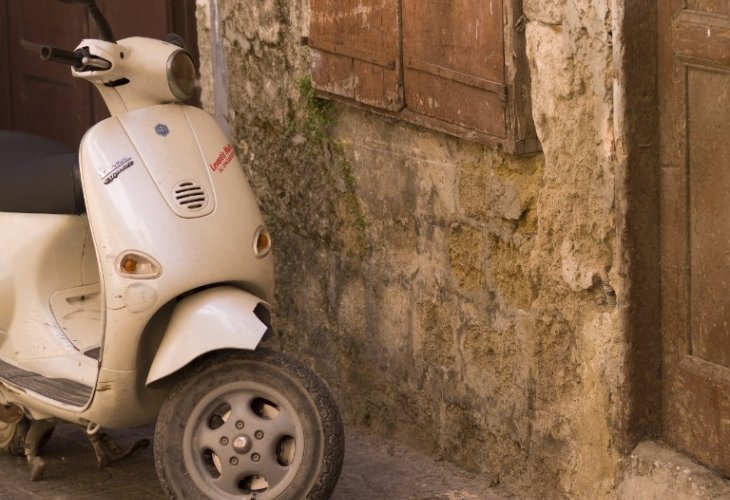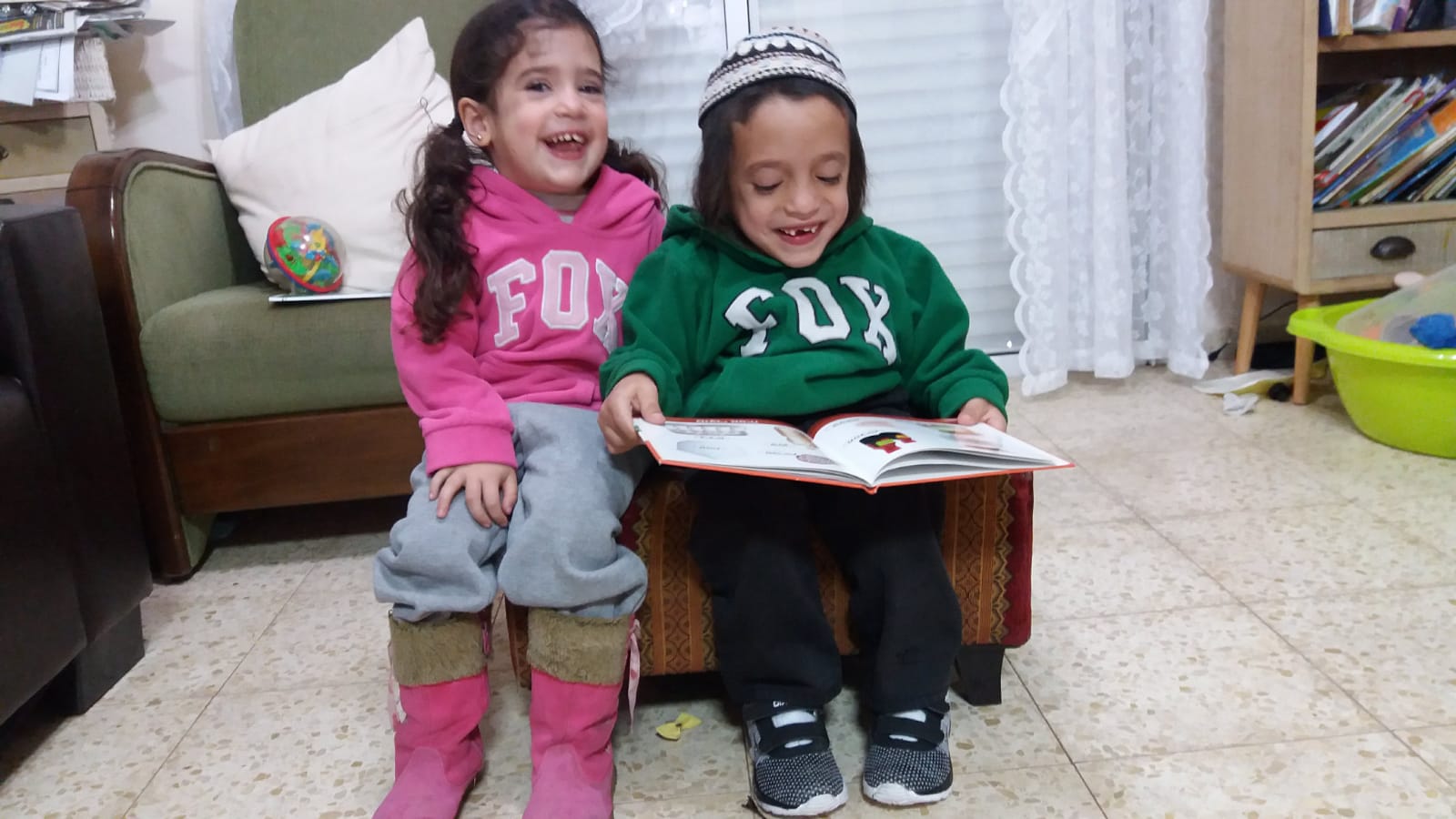"My Children Are Different, But Special": Yonah Darf on Raising Kids With Morquio Syndrome
She is a mother of five, two of whom suffer from a genetic disorder known as 'Morquio.' How does the family cope with this challenge, how do the children manage, and what do they say to Hashem about it? A heartfelt interview with Yonah Darf filled with faith.

"When Tov-Roi was two and a half, he fell off the couch and lost consciousness," begins Yonah Darf as she shares the struggle she and her family have faced for the past six years. "When Tov-Roi tried to stand up, we discovered he was paralyzed in his upper body. He was rushed to the hospital, and during the hospitalization, it was revealed that part of his spine was missing. The fall had caused swelling in the area, leading to temporary paralysis."
Tov-Roi, along with his sister Emunah, has Morquio Syndrome, a rare genetic disorder where a deficiency of a specific enzyme leads to the accumulation of hyaluronic acid in various tissues and organs in the body. This results in damage to multiple systems in the body, including the skeletal, respiratory, cardiovascular, as well as the nervous, vision, and hearing systems.

The Diagnosis
For about a month and a half, Tov-Roi was hospitalized, during which the swelling and paralysis gradually subsided. Once they did, life for the Darf family was never the same.
"As a baby, Tov-Roi had breathing problems, was quite short, had a small neck and a slightly crooked hand," describes Yonah. "But we thought these were normal issues that would pass."
Following the fall, the family was referred for genetic testing, which initially led to a misdiagnosis of a hereditary disease. "For two years, we went for check-ups every six months," recalls Yonah, "and the doctors considered it possibly an assortment of issues. One doctor suggested there was another gene worth examining, but the test was very costly and could only be done abroad, and didn't seem crucial to him. So, for two years, Tov-Roi was examined by many doctors, but no one could pinpoint the real problem. As young parents, we couldn't imagine it was something more serious and hoped for the best."
During that time, Tov-Roi was prescribed a corset—a special device that supported the abdomen and back, preventing further spinal injury. He had to wear it all day, and his parents had to ensure he wouldn't fall, as it posed a significant risk to his life. "He needed to undergo spinal surgery to address the missing vertebra," explains Yonah, "but since the doctors were unsure of his condition, they were reluctant to perform the surgery, which was extremely dangerous. For two years, they postponed the surgery until the next follow-up."
After about two years, the Darf family returned to genetic counseling. "The doctor noticed a deterioration in Tov-Roi's physical condition, identifying more skeletal deformities and muscle weakness. With this diagnosis, we consulted a geneticist, and it raised a red flag for him. He called Professor Rothschild, the leading expert in rare genetic diseases in the country, who immediately diagnosed Morquio," Yonah recalls.
Small On Him - A Film About Tov-Roi:
Bones of Different Sizes
Today, Tov-Roi is already eight years old. He has bones of various sizes in his body, is significantly short, and struggles with walking. He needs constant medical monitoring throughout the year and undergoes regular physical examinations. Tov-Roi has already had surgeries on his spine, legs, and ears, and still has a long way to go. Due to the high risk associated with anesthesia, requiring specialized equipment and knowledge unavailable in the country, each surgery demands travel and staying abroad for a while. "Several times we've had to leave the children with relatives for a few weeks and travel. The last time was in the middle of last year's Sukkot holiday, which was not easy," shares Yonah.
After the spinal surgery to fix the missing vertebra, Tov-Roi was able to remove the corset and received a neck brace for stabilization, which he wore for a year. The moment he could also remove the neck brace was significant for us, and we celebrated it with a large thanksgiving event," says his mother.
After Tov-Roi's illness was identified, Emunah, his younger sister, was also tested and diagnosed with Morquio. "The feeling was very difficult," Yonah describes. "Having one child is not easy, so having two is even more challenging. Emunah is the daughter we awaited after three sons, and suddenly all our dreams were shattered. Knowing their bodies will be different, and this will be our reality from now on, was not easy."
The path of the Darf family is undoubtedly difficult, but Yonah also sees many bright spots along the way. "Just as we discovered Morquio," she says, "a new medication was put on the market that, while not curing, greatly alleviates the condition. Had we discovered it two years earlier, we would have watched Tov-Roi's condition deteriorate before our eyes, feeling utterly helpless as we had no way to assist him. Now, however, we have a weapon to fight with."
As it turns out, the medication significantly eases the children's conditions: "It allows them to walk better and breathe easier," Yonah illustrates. "It's the difference between breathing with a machine puffing air at you all night and breathing independently, or between having surgery or not, particularly when each surgery involves travel and extended stays abroad. Having something to help the children is incredibly significant."
The medication costs about one and a half million shekels per year for each child, and as they grow, the cost will increase even more. "Initially, we were very anxious because we didn't know if we would be granted access to the medication," says Yonah. "It's such an expensive drug that it wasn't clear they would provide it to us. We had to switch to Maccabi health fund, the only one covering it, forgoing the children's long-term care insurance despite its necessity given their condition. We hope and strive each year for the drug to be added to the national health coverage, making it accessible for every Morquio patient, in any health fund."
Initially, the Darf family traveled weekly with Tov-Roi for an overnight hospitalization to receive the medication, but now a nurse comes to their home for several hours each week to administer it.
Regarding Emunah, Yonah shares: "She is the third child in the world to receive the medication before the age of one. Today she is four, and anyone seeing her on the street without knowing she has Morquio would not notice anything, indicating the medication's significant impact. We also notice the difference between her and Tov-Roi, who started receiving the medication later. Her condition is indeed better than his."
Usphizin, Aviad Darf:
Not Thinking About the Future
How do you handle the children's differences?
"While they have physical differences, we don't try to ignore that," Yonah explains. "But we do focus on their unique qualities. Tov-Roi, for instance, is extremely smart with great charisma, and his friends adore him. He might not be able to play soccer, but he's excellent at chess. He brings games to class, and his friends surround him during recess. He's also very calm, able to sit and play by himself or read books peacefully."
How do you cope as parents?
"It's not easy for us," Yonah admits, "but we adhere to several principles. Firstly, we don't dwell on what the future holds. If we focus too much on what lies ahead, we won't manage the present. Such thoughts do arise, but we have the choice to either get caught up in them or control them, and we strive to choose not to get swept away."
"Additionally," she continues, "Rebbe Nachman talks about three things that help: the tzaddik's point, the friend's point, and the point of solitude." And she elaborates: "The tzaddik's point signifies acknowledging there's someone who knows more than us, someone we can learn from. We seek places of inspiration that give us strength. We are very connected to Rebbe Nachman and have rabbis and friends from whom we gain strength."
Regarding the solitude point, Yonah continues: "It's our connection with Hashem through the Torah, prayer, and faith. Without faith, it's very difficult to face this challenge. We pray, cry, and find joy in our situation, all together."
"The friend's point concerns the environment and society. Firstly, the marriage, which must be nurtured especially in such circumstances, is not to be taken for granted. We put effort into our togetherness, providing us with much resilience. Beyond that, we focus on spending good time with our healthy children, who need us no less than Tov-Roi and Emunah. Finally, there are extended family and friends—from whom we must learn to accept help. For instance, in the first year, when we received the medication at the hospital, it was very challenging to spend every week on an overnight hospitalization with Tov-Roi. Once family and friends stepped in to assist us with this, it made a big difference."
Regarding friends, Yonah adds: "We strive to keep our friends informed about what we're going through. Just knowing someone understands what we're facing provides psychological support. When a situation arises where we truly need help, friends who are involved in what’s happening know how to help where needed."
"We try to see the good and live with faith," she concludes, "not as slogans, but genuinely. I could, for example, lament flying for surgeries, or I could say—‘Wow, how exciting to travel to the USA, I've never been there.’ I could regret that my child doesn’t run around like others, or say—‘How wonderful that I have a calm child who knows how to play so beautifully and peacefully.’ It’s not deception to me, but an optimistic outlook that gives strength."
Aviad, Yonah's husband, released an album with songs of faith, born from the crisis and hardship. Additionally, he began organizing gatherings for youth nationwide, also born from the need to deal with the situation through prayer and faith. Recently, the couple also began sharing their story together, following requests from friends.
Seeing Good, Living with Faith
What does Tov-Roi have to say about his condition?
"Tov-Roi handles his condition remarkably well with incredible maturity," describes Yonah. "There are times when he feels frustrated, like when his two-year-old brother annoys him and he lacks the strength to resist, or when his friends play ball and he also wants to join. But overall, he's a very mentally healthy child, full of life, with an incredible spirit despite the small body."
Speaking about school, she shares: "When Tov-Roi started first grade, he stood in front of his classmates and explained his condition. Later, he underwent surgery and had a cast up to his chest. Despite that, he didn't give up and found creative ways to play with his friends. Another child in his situation might have preferred staying home and not seeing anyone, but Tov-Roi was eager to go to school and be with friends, even during this difficult period."
Regarding his mobility, Yonah adds: "He can't walk long distances and primarily uses a wheelchair or small bicycle, but it's amazing that he still wants to get out and does not isolate at home. He visits friends, and overall – he's a very lively child."
Yonah concludes this powerful interview with an insightful understanding: "In our relationship with Hashem, we've come to understand that we don't pray because something was done improperly and needs to be changed; instead, we believe that what Hashem grants is meant to happen. Our prayer comes from a place of letting go, accepting Hashem’s will, and simply asking for grace. Additionally, we believe our life’s purpose isn't to learn, work, or even marry or have children. Our purpose is to serve Hashem, and that - can be done in any body."
To get in touch with Yonah: yonadarf@gmail.com

